What does 14 days prison mean to the Papadopoulos puzzle?
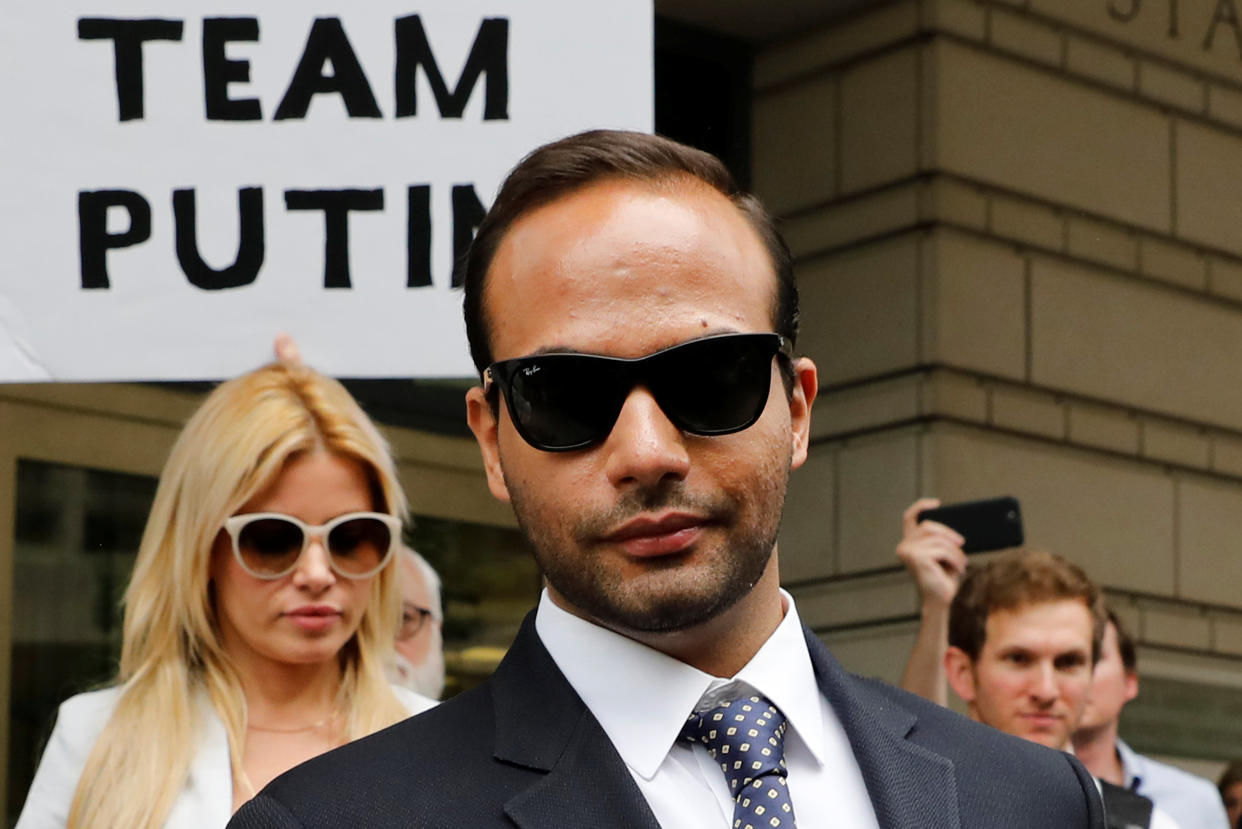
WASHINGTON — George Papadopoulos, long considered a key cooperating witness in Robert Mueller’s investigation of Russian interference in the 2016 presidential campaign and possible collusion with Donald Trump and his associates, was sentenced today to just 14 days in prison for lying to federal investigators.
The two-week sentence falls far short of the possible five years he could have faced, but reflects what the judge called Papadopoulos’s “genuine remorse.”
“Just the process of having to go to prison will leave a strong impression on him for the rest of his life,” Judge Randolph Moss said, in imposing the sentence Friday afternoon.
The sentence was likely a disappointment for Mueller’s office. Andrew Goldstein, one of Mueller’s prosecutors, argued in court that Papadopoulos didn’t come close to the standard of “substantial assistance,” and he made “at best, begrudging efforts to cooperate” in the investigation.
Goldstein called the Papadopoulos case “more serious” than that of Alex van der Zwaan, who was sentenced to 30 days for lying to the FBI. The judge would later point out that van der Zwaan, in contrast to Papadopoulos, had not shown remorse at his sentencing hearing.
However, Trump, who had repeatedly called the Mueller probe a “witch hunt,” greeted the verdict as a victory. “14 days for $28 million – $2 MILLION a day, No Collusion, A great day for America!” Trump tweeted following announcement of the verdict.
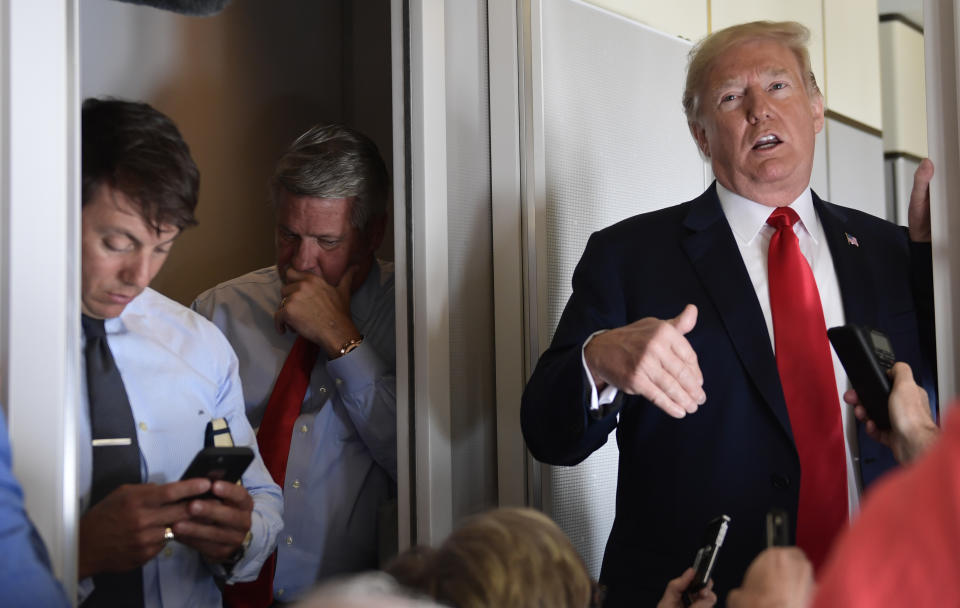
The financial numbers are presumably a reference to the costs of the Mueller investigation.
Ever since his plea agreement, Papadopoulos has been portrayed as a key cooperating witness in the special counsel’s investigation, yet plea documents show, and have been confirmed by later revelations, that Mueller’s team did not expect much from him.
When his plea deal was announced, Papadopoulos appeared to be an important witness for the special counsel’s investigation. Papadopoulos’s plea to a single count of false statements to the FBI was secured under seal in early October of 2017 and unveiled at the end of that month at the same time Paul Manafort and Rick Gates were indicted.
Many commentators took the simultaneous revelations as a deliberate contrast presented by the special counsel’s office to other interested parties. On one hand, Manafort and Gates initially both refused to help the investigation (Gates later cooperated), while Papadopoulos seemingly worked hand in glove with the special counsel, pleaded guilty, and got a nice and easy deal — a single count, carrying an estimated sentence of zero to six months, based on federal sentencing guidelines. He would be away from his new wife for a hockey season, at most.
Papadopoulos, a foreign policy adviser to Trump’s campaign, is the man who provided the impetus for the counterintelligence investigation into Russian meddling in the 2016 election in the first place. He had reportedly opened up to an Australian diplomat about the Russians offering him dirt on Hillary Clinton during a tipsy encounter at a wine bar in London in May 2017. The information about that encounter was passed to the United States and that became the Mueller investigation shortly after Jim Comey was fired in the summer of 2017.
In one sense, the picture of Papadopoulos as helping the special counsel’s investigation has some truth to it, particularly in contrast to Manafort. By signing his name to his “Statement of the Offense,” Papadopoulos publicly advanced the special counsel’s main investigation significantly. This narrative is the most substantial direct evidence that the Mueller investigation has made public of links and coordination between the Russian state and an individual associated with Trump’s campaign, and it is closely related to Russia’s interference in the 2016 election.
Papadopoulos admitted under oath that he lied to the FBI about his dealings with a shady London-based professor (Joseph Mifsud) who took great interest in Papadopoulos only after learning he was a foreign policy adviser to the Trump campaign. Papadopoulos admitted Mifsud introduced him to a Russian woman whom Mifsud represented (falsely) was Vladimir Putin’s niece and to an individual in Moscow with connections to the Russian foreign ministry, both of whom assiduously sought to set up meetings between the Russian government and the candidate or the campaign through Papadopoulos.
Papadopoulos admitted Mifsud later told him that, based on Mifsud’s conversations with high-level Russian government officials, the Russians had “dirt” on Hillary Clinton, including “thousands of emails.”
These admissions are powerful public evidence establishing the Mueller investigation’s credibility. Since his guilty plea became public, Trump, the White House, and their Republican allies have sought to minimize Papadopoulos’s role in the campaign.
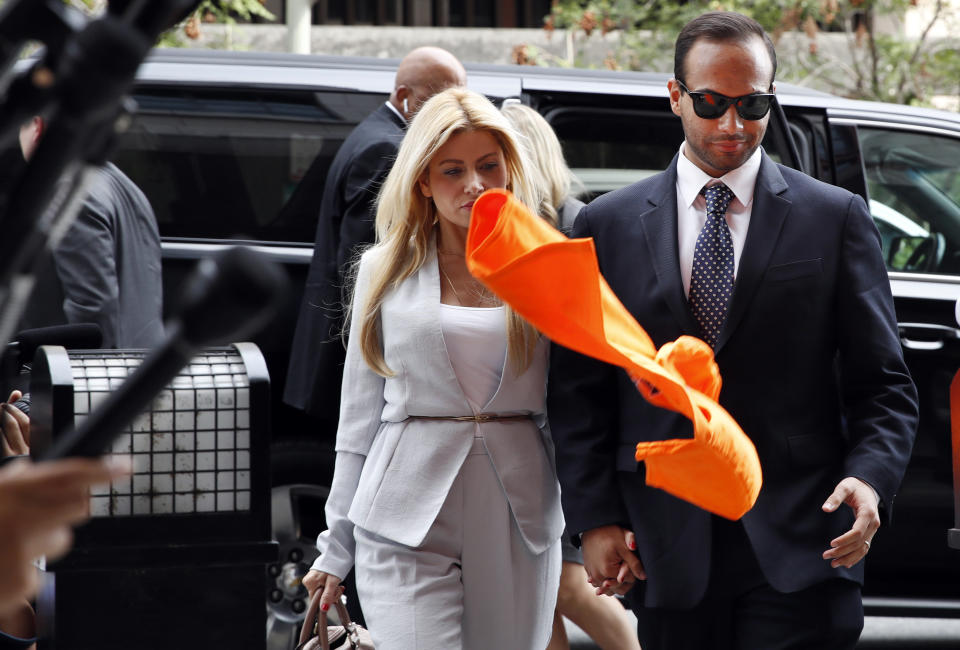
Given how central Papadopoulos’s evidence appears to be to Mueller’s investigation, it’s reasonable to assume that prosecutors valued him as an important witness and sought to secure his cooperation when he pleaded guilty. However, from the first revelation of his involvement with the investigation, there were clues in his unusual plea agreement that showed this was not the case.
Four of the five defendants who have pleaded guilty so far, including Papadopoulos, have plea agreements that mention cooperation. (Alexander van der Zwaan, the well-connected London lawyer who admitted to lying and withholding evidence from the government in their investigation of Manafort and Gates, is the only one who doesn’t.) In all but Papadopoulos’s case, these men agreed to cooperate with the government and their plea agreements go into great detail about the scope of their expected cooperation; for instance, the other cooperators agree that they’ll participate in “undercover activities” or “covert law enforcement activities” as well as attending debriefings and producing documents.
In return for these binding promises, the government agreed to not only inform the judge at sentencing about each defendant’s cooperation, but if it was determined that they had “provided substantial assistance in the prosecution of another person who has committed an offense,” then the government would file a formal motion under the sentencing guidelines allowing the defendant to argue for a reduced sentence.
The cooperation provision of Papadopoulos’s agreement is different in a telling way. Papadopoulos never expressly agrees to cooperate, and all the detailed provisions about what his cooperation might entail, such as undercover activities, are not included; moreover, the government does not agree to make the formal motion allowing for a reduced sentence if Papadopoulos provides substantial assistance to the investigation.
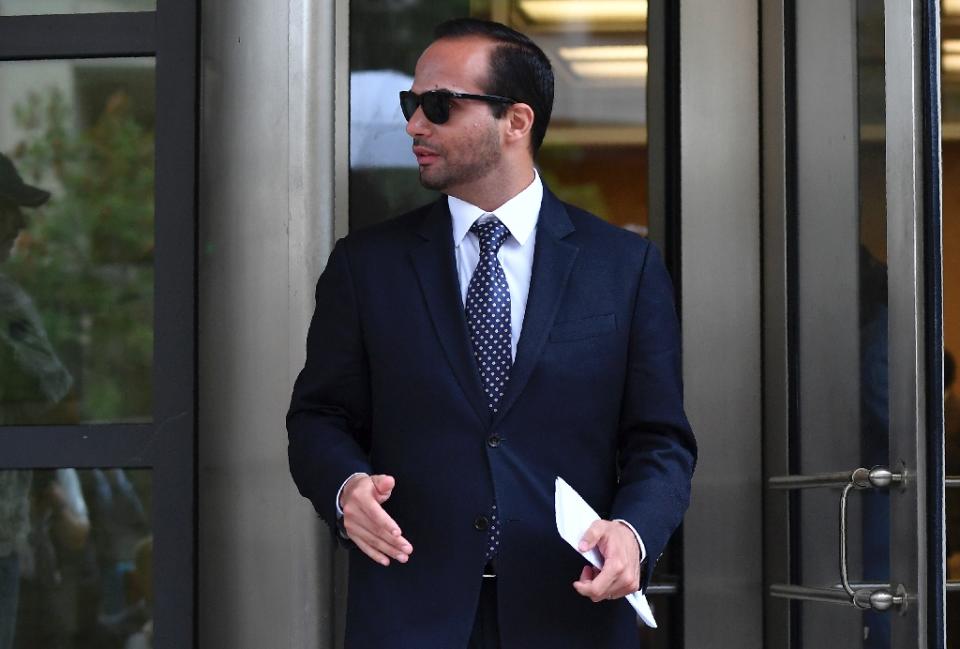
In lieu of the standard provisions, the prosecutors agree to “bring to the court’s attention at sentencing the defendant’s efforts to cooperate,” and reserve the right to delay sentencing until Papadopoulos’s “efforts to cooperate have been completed.” These limited terms are a subtle signal that, even at the time when Papadopoulos’s plea agreement was being negotiated, Mueller’s team did not expect much from him.
Prosecutors did not secure his promise to cooperate and they did not promise him the standard reward under the sentencing guidelines for any cooperation he gave voluntarily. Although few observers made much of it at the time, the limited cooperation provisions imply that the relationship between Mueller’s team and Papadopoulos had soured by the time the plea agreement was signed, and the government was not prepared to offer him anything concrete for whatever he might in the future decide to tell them.
In a sentencing memorandum filed in mid-August, the special counsel’s prosecution team confirmed that implication and explained all that had gone wrong between them and Papadopoulos. (Papadopoulos’s reply memorandum can be found here.)
First, Mueller’s prosecutors wrote, his initial lies to investigators at his FBI interview in January 2017 “caused damage to the government’s investigation into Russian interference in the 2016 presidential election.” In minute detail, the prosecutors describe how Papadopoulos voluntarily went into an FBI office in Chicago and lied repeatedly over the course of two hours to obfuscate the truth of his interactions with Mifsud and the Russians. Papadopoulos lied, they wrote, “in order to conceal his contacts with Russians and Russian intermediaries during the campaign … early in the investigation, when key investigative decisions, including who to interview and when, were being made.”
In a remarkable footnote rebutting claims Papadopoulos’s wife has made in several media interviews, Mueller’s team provided a blow by blow account of how they learned that Mifsud, whom they refer to as “the Professor,” had told Papadopoulos that the Russians had Clinton-related emails and how Papadopoulos, whom they refer to as “the defendant,” resisted their inquiries all the way and misled them about the sequence of events.
Papadopoulos, for example, falsely claimed he met Mifsud before he worked on the Trump campaign.
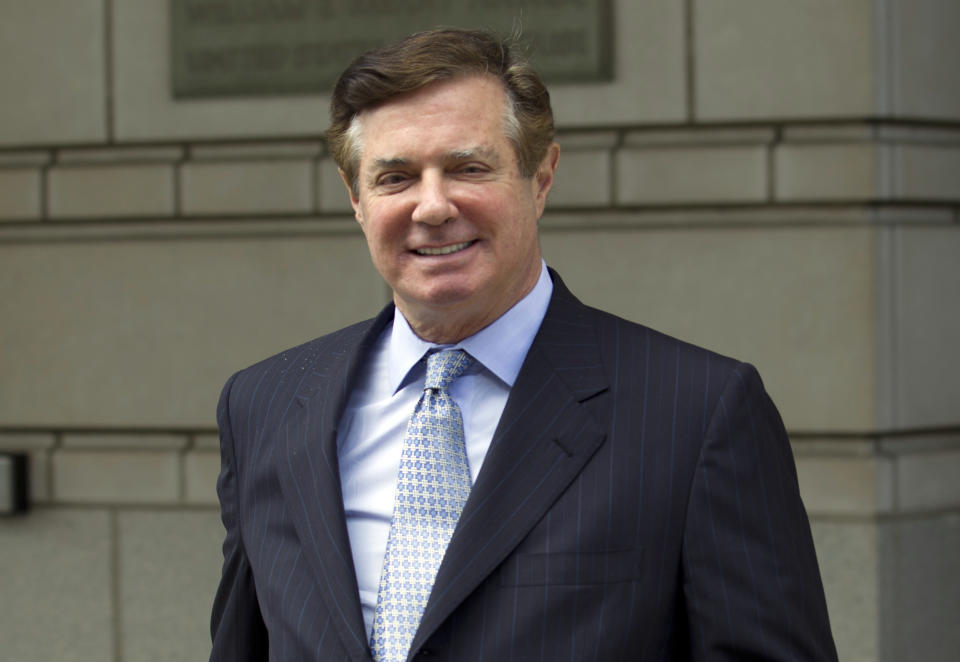
After the January 2017 interview, Papadopoulos retained an attorney and returned for a second FBI interview in February, but even then he did not correct the record, Mueller’s prosecutors point out. Instead, around that time, he deleted his Facebook account, which contained communications from Mifsud. Papadopoulos’s lies had a material impact, the prosecutors wrote, because they “substantially hindered investigators’ ability to effectively question [Mifsud] when the FBI located him in Washington, D.C., approximately two weeks after [Papadopoulos’s] January 27, 2017 interview.”
Mifsud left the United States on Feb. 11, 2017, and has not returned, according to the memorandum. It’s unclear what the FBI was able to learn from him before he departed.
Second, Papadopoulos failed to be helpful to the special counsel’s office even after they arrested him and confronted him with his false statements in late July 2017. At that time, he agreed to four days of meetings to discuss cooperation in preparation for a potential plea deal over four days in August and September 2017. These sessions were a disaster. Papadopoulos was recalcitrant and provided information “only after the government confronted him with his own emails, text messages, internet search history, and other information it had obtained via search warrants and subpoenas,” Mueller’s team wrote.
The prosecutors’ frustration with Papadopoulos’s behavior explains the stunted cooperation deal included in Papadopoulos’s plea agreement, but it raises questions about Papadopoulos’s plea deal itself. Why was a man who had caused material damage to the investigation and offered no “substantial assistance,” by prosecutors’ own description, allowed to plead guilty to only the least serious charge indicated in his Statement of the Offense? Why didn’t Mueller’s team throw the book at him?
Papadopoulos admits to repeatedly lying to the FBI about three discrete subjects, yet he was only charged with one count of that crime. He also admits to destroying evidence by deleting his Facebook account.
Destruction of evidence is a more serious offense than false statements; it carries a statutory maximum sentence of 20 years, compared to 5 years for deceiving the FBI. However, Papadopoulos was not required to plead guilty to destruction of evidence. When Papadopoulos’s seemingly lenient plea was first announced, explanations of it tended to focus on his potential value to future prosecutions as a cooperator; that value doesn’t appear to exist.
One potential answer is that Papadopoulos’s plea was efficient. It allowed prosecutors to conserve resources and move on, rather than facing the expense and difficulties of a trial for a low-level player. Another potential answer is that prosecutors, managing an unusual investigation in the face of an adversarial White House, chose to strategically limit the amount of information disclosed about Papadopoulos’s involvement.
____
Read more from Yahoo News:
Omarosa says she’s ready to testify at Trump’s impeachment trial
House Intel Dem: Trump collusion with Russia ‘is well established’
Unborkable: Kavanaugh heads into confirmation hearings on cruise control
Former presidents pay homage as McCain takes his place in history
Cory Booker is on the campaign trail, but not in the way you might think

